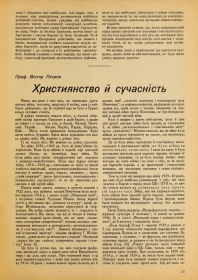Christianity and the present time. In Orlyk, No 2, 1947, pp. 15-18.
Keywords:
philosophy of history, totalitarianism, criticism of rationalism, philosophy of Ukrainian emigrationSynopsis
Viktor Petrov's article presents the author's reflections on the nature and ideological content of the Second World War, which, at the time of publication, had ended two years earlier. The author draws several important conclusions: 1) this war was not only a war of two imperialisms (national socialist and Bolshevik), but also a war of ‘two worlds’ (p. 15) - the democratic world and the national socialist world; 2) the Second World War can be considered a kind of ideological continuation of the First World War: ‘If the First World War [...] was defined as a war for the high achievements of civilization, democratic and pacifist ideals of progress and freedom, law, morality, humanity, [...], then this was even more clearly revealed in this second war’ (ibid. ); 3) the emergence of national socialism became possible due to a whole range of historical reasons: misinterpreted ideas of the Enlightenment, the reaction to the Peace of Versailles, the fascination with the Nietzschean concept of the superman, and - most importantly - the complete absorption and replacement of the church by the state, which led the Fuhrer to assume the role of the harbinger of Providence; 4) the technical achievements of mankind, which are the result of the long dominance of a rationalistic attitude to the world, have turned out to be non-ethical, and a person who has witnessed the destructive power of technology should rethink his spiritual opposition to the natural world, in which the Christian faith can help.
Vlada Davidenko
Downloads




